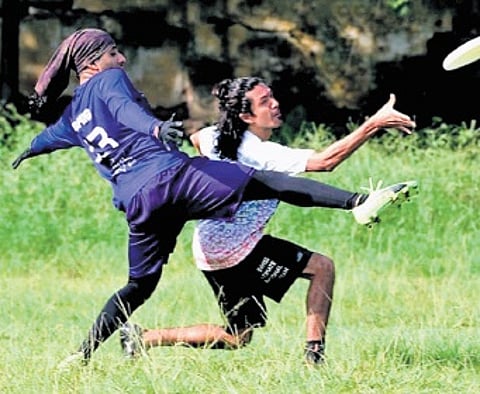

BENGALURU: Thrice a week, in the early mornings and late evenings, the National College grounds bursts into life with the energetic activity of men, women, and teenagers chasing a flying disc.
Players sprint across the field, catching and throwing the disc to one another in a game that stands out from more traditional sports, drawing curious glances from onlookers. This is Ultimate Frisbee, or simply Ultimate – a fast-paced, uniquely egalitarian sport that has quickly gained popularity among Bengalureans.
Once considered a niche activity, Ultimate now attracts a diverse array of participants from all walks of life, and the National College grounds is just one of many haunts. Sai Teja Repalle, a product manager at a tech company, recalls his introduction to the sport during his time at the Indian Institute of Management Bangalore (IIMB). “I wasn’t aware of the sport before joining IIMB,” he says.
“But it was already popular at other IIMs, and there was an inter-IIM tournament called Sangharsh where Ultimate was played.” Intrigued by the flying disc and the variety of throws like the backhand and forehand, Repalle quickly fell in love with the game. In 2021, he started the community Ultimate Frisbee @IIMB on campus.
The rise of Ultimate in Bengaluru mirrors global trends. It is a high-energy, non-contact sport that blends the fast pace of football, the strategy of rugby, and the pure joy of tossing a flying disc (frisbee). Played by two teams of seven, the goal is to pass the disc down the field and catch it in the opposing team’s end zone-without running with the disc.
Edwin Kagoo, a recruiter at a cybersecurity company and founder of Team Disc’iples (a play on the words ‘disc’ and ‘disciples’), which started as a casual church group but has since grown into a competitive team, notes that interest in the sport has surged since 2021. “There’s been a noticeable increase in teams, especially after Covid.
We now have more college and school teams coming up, and some bigger teams like ours have even split into two so that more players get game time. I’d say at least 10 new teams have popped up in the last four years,” he shares. “When we play on a turf, people are always curious about how the disc flies. It’s different from sports like football or cricket, and therein lies the novelty.”
Unlike many traditional sports, Ultimate emphasises the ‘spirit of the game,’ a philosophy that promotes self-refereeing, where players are responsible for ensuring fair play. “Players are responsible for making sure they play safely and avoid injury,” says Sreelatha J, a professor at IIMB who first encountered the sport when she saw her students playing on campus.
It wasn’t long before she picked up a disc herself and joined a community called TIKS (Tatte Idly Kal Soup) Ultimate. Quirky name aside, TIKS Ultimate represents a broader trend of informal community-based teams that practise regularly and play competitive matches.
“It’s a completely non-contact sport – you can’t just ram into people; you have to maintain space,” Sreelatha explains. “The game relies on skill rather than contact, and it’s one of the most physically demanding sports. If you’re not working on your fitness, you’re more likely to get injured.
Most people who play Ultimate regularly focus on fitness, and for me, that’s a big motivator,” she adds. “Most sports are divided by gender, with different levels of physicality. But Ultimate Frisbee works well as a mixed-gender sport. Plus, my whole family plays – my husband plays, I play – so it’s something we can enjoy together.”
Similarly, Kagoo, emphasises the strong sense of community the sport fosters. His team includes players ranging from 16 to 35 years old, of both genders and even individuals with disabilities. “Even if they can’t participate in tournaments, we make sure they enjoy the game,” he says.
But the biggest challenge for players, however, is the lack of open spaces in Bengaluru. “Unlike Chennai, where people play on the beach, we have to rent turfs or use public grounds,” Sreelatha points out. Despite this, the community has adapted, with early-morning practices and smaller five-a-side games becoming increasingly common.